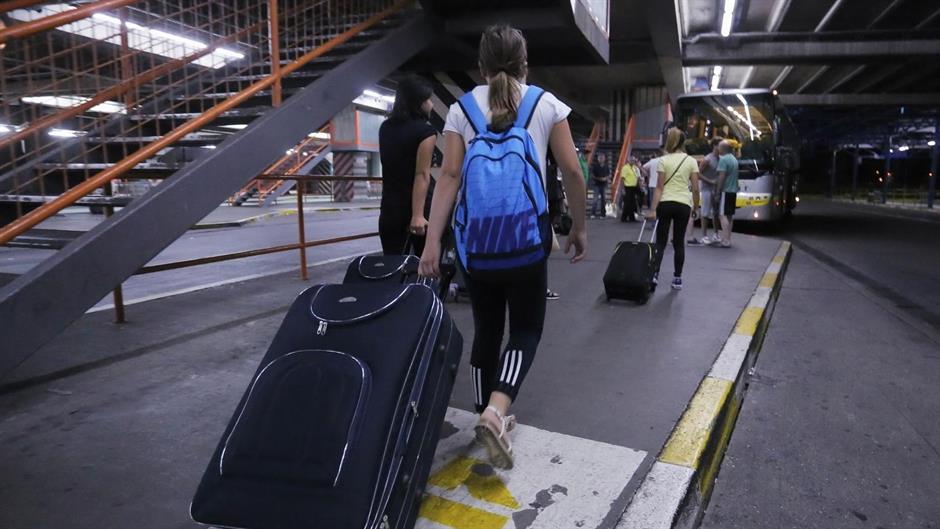
Many Bosnians want to search for a better life and employment outside the country. Finding a job in a foreign country is not the difficult part of that plan. Getting a work visa is.
A Bosnian Facebook group titled 'We are going to Germany' counts more than 57,000 members. The group gathers people who do not see a future for themselves in Bosnia due to a variety of reasons, such as lack of employment opportuinities, a low standard of living, lack of perspective and lack of political and economic stability.
Members do not care for any sort of national, religious or political divisions, as opposed to most other Bosnian discussion platforms on social media. They are united in their wish to depart for Germany.
The biggest problem most say they face is the long waiting period for appointments to apply for work visas.
"Considering the fact that appointments in the German Embassy in Sarajevo are set catastrophically slowly for people who have already found employers in Germany and have signed working contracts, more and more often those contracts are being terminated," a working permit seeker from Bosnia’s Krajina region told Deutsche Welle.
"My wife and I have found an employer, signed a contract and we are supposed to begin work in about a month. However, considering the current situation, I can only expect an appointment for my visa in November or December, although I registered in June 2017!" he said.
"I am afraid that the employer will terminate my contract, as I already told him there is no chance that I will be able to begin working according to the contract, as I did not get an appointment in the Embassy," he said, adding was not sure if he should even inform the employer that he is expecting an appointment some time in the end of 2018 at best.
Many others told Deutsche Welle about this issue, and they were desperate, embittered and scared. They were happy to speak about their problems, show documents and ask for help, but they insisted on remaining anonymous, as many of them still financially rely on their current employers in Bosnia. Others are afraid that criticising the German administration may badly affect their working visa applications.
One of those who spoke to Deutsche Welle is a Banja Luka citizen who got a job as an IT specialist in the Berlin company Zalando a year ago. The position is named in a list of scarcely filled jobs in Germany, compiled by the country’s Employment Agency.
He managed to get an unlimited working contract which includes a six-month trial period. He immediately contacted the Embassy to schedule an appointment for a working visa but they kept putting off, he said.
In line with this, he kept asking Zalando to put off the working contract and set it to later and later dates.
He said that the company’s representatives directly contacted the Embassy some time in the beginning of this year and that they were told not to call anymore as the calls represent "an attempt to mount pressure on the Embassy."
The company terminated the contract.
The German Embassy was never willing to make a statement on this problem. Any questions any of the applicants had for it were forwarded to the Ministry of Foreign Affairs in Berlin.
Waiting periods for visas could extend to 18 months.
According to unofficial information, the Embassy had asked for help in conducting the operations and got two additional German and two local employees working on visa applications.
"After amendments which make employment easier (in Germany) were adopted in the beginning of 2016, an enormous increase in visa applications in Western Balkan countries was registered. Only in 2017, the visa department of the Embassy in Sarajevo has processed more than 17,000 such applications," Germany’s Foreign Affairs Ministry told Deutsche Welle.
"In this way, Sarajevo, just like Pristina and Belgrade, in among the 10 cities in the world where the most visa applications for Germany have been registered," the Ministry said.
The number of employees working on consular jobs in Western Balkan countries has been increased to the maximum, but this is still not enough for every request to be tended to timely, it said.
"In any case, the waiting periods for appointments for visas for workers with lower qualifications, such as in the construction and catering sectors, last for longer than a year, which is not acceptable," the Ministry admitted.
Another Banja Luka citizen told Deutsche Welle that, although he has a university degree, he applied and accepted a job in a warehouse with a company in Rosenheim, Bavaria.
"As I was unable to find a job in my field, faced with many illogical barriers in the system in Bosnia, I decided to leave my family, my girlfriend and my friends so that I could finally (…) have a normal job, one where I would be registered, where I would have health insurance, where my salary would be paid into my bank account (...) and where I would avoid mobbing and various manipulations from my employer," he said.
The German Employment Agency granted his request, but he still did not get a working visa.
The German employer had understanding and patience for the situation, all until February this year.
But even though this job opportunity fell through, the man from Banja Luka did not lose hope. He applied for a job in McDonald's and signed a contract. This, however, fell through as well after several months of waiting.
But he is persistent. He said he is still hoping that he will get a working visa by October and go to Germany.
A Sarajevan told Deutsche Welle he has been waiting for a working visa to work in Bavaria, near Munich, for more than a year already.
His wife was luckier, as she, as a medical technician, got a job more than a half a year ago under a shortened procedure.
They both applied at the same time, he said, but the difference is that she is a qualified medical worker, while he is trying to work as an assisting medical technician. He is now waiting for a working visa and hoping he will soon sign his third working contract for the position. One of the conditions for the working visa is a signed contract in Germany not older than six months.
Those applying for jobs in the medical sector have it easier, Germany’s Foreign Ministry said, as there is an agreement between Bosnia’s and Germany’s employment agencies.
A young married couple from Sarajevo explained the reason for their wish to leave the country and go to Germany together with their two small children.
The husband is already employed in the transport and logistics sector, and he got an offer to do a similar job in Germany.
"We decided to find something better for a number of reasons. Above all, we want to leave Bosnia because of these two small children, because of their future. Of course, there is also the financial and political situation in Bosnia," they said.
Kakvo je tvoje mišljenje o ovome?
Učestvuj u diskusiji ili pročitaj komentare





 Srbija
Srbija
 Hrvatska
Hrvatska
 Slovenija
Slovenija


























































